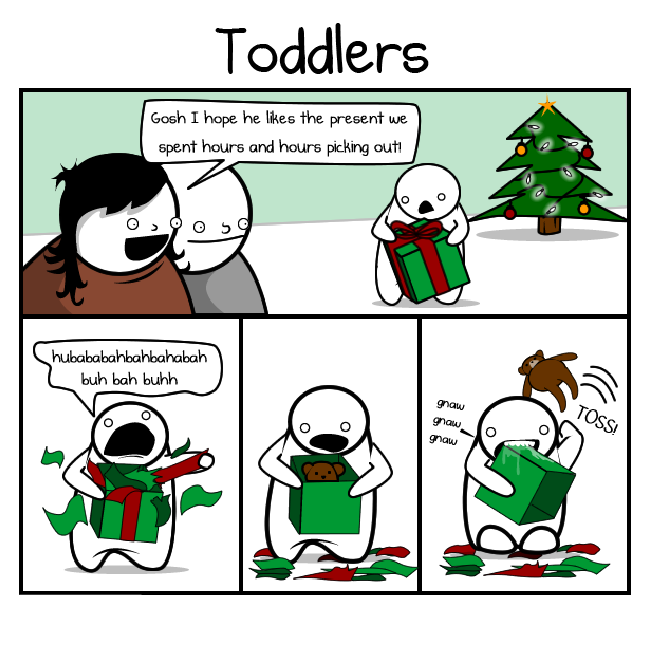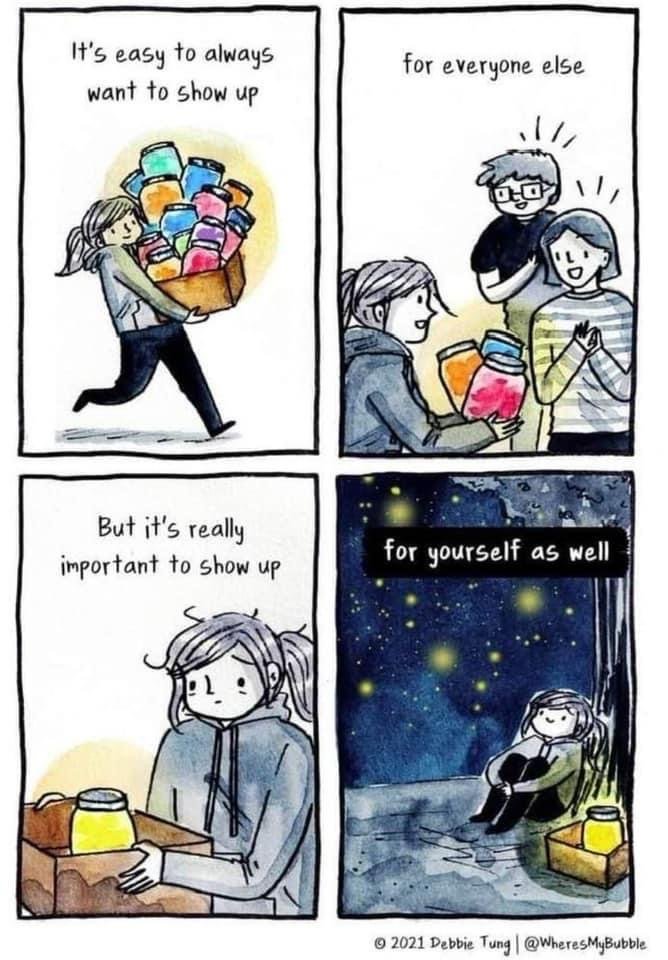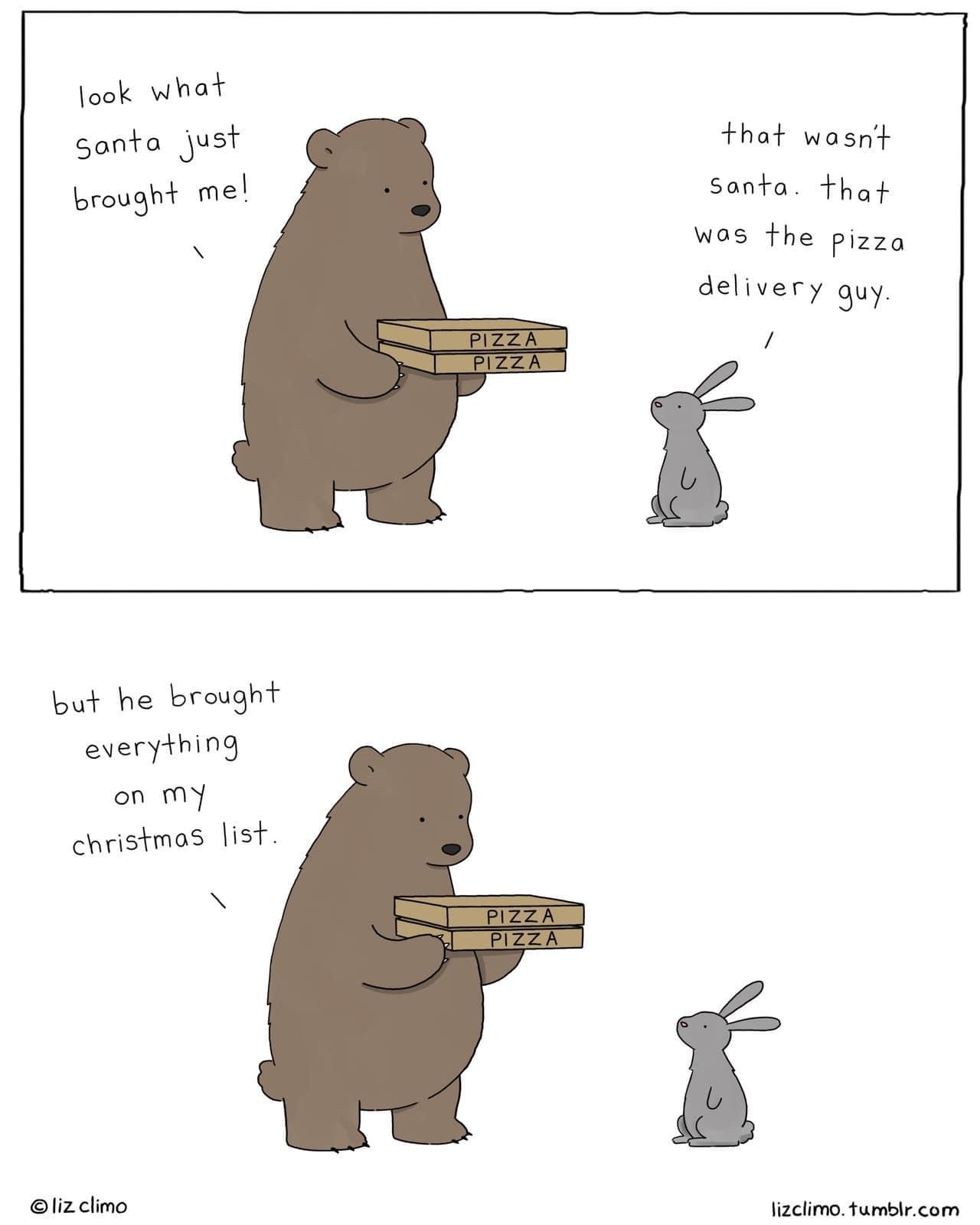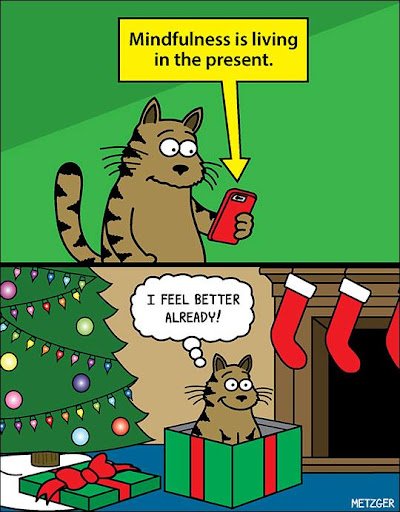Christmas has always been a bit of a weird time for me.
I grew up actively ‘not’ celebrating Christmas for religious reasons. For the record – in case my family is reading this – I never missed it, and always enjoyed our ‘not Christmas’ barbecues at the beach.
In my early twenties, my friends’ and work colleagues’ families learned about this, and - despite my protests that it really was just like any other day for me - they insisted on inviting me over. A few of the people who were kind enough to extend an invitation were people I barely knew.
Consequently, for a couple of decades or so, I was a tourist at other families’ Christmas Day. I was the recipient of huge generousity in time, warmth, food and presents. It felt like being adopted, for one day only.
Being an ‘alien’ at Christmas - artist credit Nathan Pyle, Strange Planet series. Twitter Facebook Insta
I’ve had Christmas with big families, small families, ‘Christmas that isn’t Christmas’ with my own family (which was a sort of Christmas tradition in itself), and Christmas with other people who grew up ‘not celebrating Christmas’, and instead sort of mangled together a variety of off-the-wall celebrations.
One year, my Dad (who also grew up without Christmas, and hasn’t celebrated it for most of his life), brought a tree round to a friend’s house– a real one, and about 8 foot tall.
Dragging it through the kitchen into the living room was an absolute mission. It was several foot taller than the ceiling, but we managed to get it upright with the top curled over and trailing along the plasterboard. The house smelled very pungently of pine, the carpet was littered with pine needles, and we all had hay fever for days, but it felt like a very romantic gesture.
In all of my versions of Christmas (besides the solo ones of course), there’s been some combination of friends, family, presents, food, TV/movies and/or card games, board games, crafting, jigsaw puzzles, books, and a metaphorically ‘open door’ where waifs and strays such as myself become family.
Crafting at my first Xmas with my in-laws. My mum-in-laws is the excellent festive snowman far left. Mine is the terrifying abomination next to that. I feel like this is a pretty good representation of personalities at family Christmas gatherings.
In NZ, there were trips to the beach, the red bloom of Pohutukawa trees; the sound of tuis, the feeling that a whole summer is spreading out ahead of you with the promise of festivals and road trips. Kiwi music, the smell of barbecue, cold drinks on verandahs and if you were lucky, pavlova, and somebody’s perfect version of trifle.
In the UK, the first thoughts of Christmas appear as the clocks go back, the nights start closing in, the ground is littered with golden leaves and I have to get out of bed ten minutes earlier every day to allow time for de-icing my car before work. Mulled cider starts to appear on pub menus (dangerous and delicious). It’s a time for hats, gloves, scarves, long boots, hot chocolate and comedy at old theatres.
From mid-November, everything in the UK is mulled. You can even buy Xmas-scented loo roll, dishwashing liquid and bleach.
Mince pies (the fruit sort, not the kind you get from an NZ servo) are taken very seriously. Coming home with the first packet of ‘mince pies’ of the season, or finding them in the staff lunchroom, is accompanied with a very particular sort of joy. Everyone has an opinion on which brand is best, and entirely serious conversations will be held around the quality of the filling, the pastry, the bite, the cost.
City streets start to smell of roasted hazelnuts and mulled wine. Your breath hangs in the air. You walk around market stalls admiring wooden toys (does anybody actually buy them?) and drive around towns to look at the lights. Love Actually, Die Hard and Gremlins rocket to the Netflix top ten. Everything glitters, and shops dress themselves in jewel colours and sequins.
There are two types of people in this world. Those who think Die Hard is a Christmas movie, and those who are wrong.
‘Christmas dinner’ might be served at 12, mid-afternoon or evening, depending on who you’re with. Whatever time is chosen will be the ‘correct’ time, and your host will be prepared to defend it to the death. Someone brings out a fruit cake, and hardly anyone eats it. There’s an endless supply of cheese. The Queen gives a speech, and people who normally never mention politics share their opinion on the relevance of the monarchy.
There’s a feeling that the year is coming to a close, which can bring warmth, relief and nostalgia. Having spent the last half of November and first half of December racing to ‘get everything done,’ there’s a collective exhale, as all the things that didn’t get done don’t matter anymore.
December can be a time for holding on (to the people that you love) and for letting go (of all the projects you didn’t manage to finish before you clocked off).
If you love Christmas, or you shrug it off without much thought but it doesn’t raise any emotional triggers or stressors, this blog post is not for you (although it might help you to understand others who are less enthusiastic about this time of year).
Crack out the prosecco / sparkling grape juice, put a 90s film on the telly, howl along with Mariah Carey, call your nearest and dearest and tuck into the Quality Streets/Celebrations.
For everyone else, read on.
Christmas, on the whole, has been great for me, throughout my life. Don’t get me wrong – there's been stress, social awkwardness, loneliness and a that sort of FOMO (fear of missing out) feeling that comes from wondering if everyone else out there is doing 25 December better, somehow. But on the whole, I’ve been able to choose how I celebrate Christmas and who I celebrate it with, and for that I feel very lucky.
I’ve also had a fly on the wall view of the kind of tension that Christmas can stir up for others.
Why is Christmas so hard for some people?
So far, I’ve referred solely to Christmas. That’s because it’s December, and ‘tis the season’ but also because Christmas is the festivity that I grew up with (and without), so it’s the one that’s relevant to me. However, the same could apply for any big occasion that involves spending money and time with people, and societal/family expectations.
I could write pages about why people might find some or all aspects of Christmas and similar holidays difficult (in fact, I did, and it was far too gloomy). Money, grief/loss and remembering those who aren’t with us this year, stress, covid anxiety, climate anxiety, managing interpersonal relationships, living with chronic illness when others are at their most social, an onslaught of triggers for family trauma and addiction, co-parenting and the grief of spending the day without your child; these are just some of the reasons.
Artist Credit: Sarah Andersen
Then there’s your milder but still difficult stuff – disliking small talks and crowds, a sense of rebellion against ‘forced joy,’ not knowing what to do with yourself when you tend to get your sense of purpose from work and have a few days or weeks of annual leave foisted upon you. The gift of social awkwardness that just keeps on giving, ALL DAY (at least). For some, overt mention of religion will be upsetting and for others, the secularisation of a meaningful date.
Artist credit: Sarah Andersen again (she’s just too good).
I imagine that for anyone with sensory issues, Christmas is like being trapped in a stage show with ‘warning, contains lights and loud noises’ for an entire month (minimum).
Artist credit: Going retro with Jim Davis (Garfield was my first comic love, FYI).
For anyone whose identity is divergent to their family, Christmas can be an annual reminder of all the ways in which we are different from the notions of ‘normal’ that we grew up with (feelings that might be dulled through the year if we usually spend our time with people who are like us).
Artist credit: Loading Artist
A big part of anxiety and sadness around Christmas boils down to the gap between the image that we are sold and what we feel is our reality.
Christmas in popular culture is a great big glitter ball of fun and glamour, where everything twinkles and sparkles, combined with a cosy hug. In films and adverts, family tension is always somewhat light hearted and always resolved. Everyone seems to either be able to afford everything, or a rich benefactor helps them out in the end, OR, they manage to be broke in a heart-warming fashion. Sure, the fridge is empty and the power has been cut off, but love warms the house and fills the belly.
The original ‘This is Fine’ artwork was created by KC Green for the comic Gunshow. I’m not sure who added the Christmas hat.
People indulge without consequences. No one sneaks back into the kitchen crying and puts their head straight into the leftover trifle.
Artist credit: Rosie Made a Thing
Presents are unwrapped joyfully – there's no excess rubbish, fighting or screaming. There’s no dishes, no messy kitchen, no one who has had too much to drink. No one is left out or lonely.
Meanwhile, our Facebook and Instagram feeds, and our imaginations, are full of pictures of other people who seem to be having a perfectly splendid time.
Our idea of Christmas wars with our reality, and most of the time, by comparison, our reality comes up wanting.
Artist credit: The Oatmeal (Matthew Inman)
Covid, lockdowns and emerging from them has added an extra layer of tension. Not just the fear of contagion or political debate, financial fears and upset that loved ones are not able to travel to us, as difficult as all these things are.
There’s also the well-meant questions that come every year from people we haven’t seen for a while. “So, what have you been up to?” This will be easy enough to answer for those of us who gelled immediately to working from home or managed to turn unemployment into a sabbatical.
If, on the other hand, you spent three months eating crisps, binge-watching Netflix and avoiding your bank mail, you might have started dreading Christmas small-talk in October.
Love it or hate it, Christmas is very difficult to avoid. Every year it seems to start earlier, and the glitz, shine, loudness and pervasiveness of the festivities make it very hard to ignore.
How can you get through it?
All of the usual tricks for maintaining resilience apply here.
Maintaining your resilience is a bit like maintaining your physical health.
It’s a bunch of small, helpful habits performed regularly that rack up positive results over time.
Movement, good nutrition, avoiding overwork, training ourselves to limit negative triggers (such as avoiding the news during times we feel anxious), getting sufficient good quality sleep and learning to build and reach out to support networks.
To be clear - doing all of these things will not make anyone immune to anxiety, depression, or any other mental health issue. They simply can help, in the same way that eating plenty of fruit and veg is good for your health, but won’t make you invincible.
Christmas-time brings with it added pressures and stressors that are unique to celebratory events and can pile on top of an already difficult year. Even the hardiest person can feel their resilience wane in the last weeks of December.
Artist credit: Gemma Correll
Here are some extra, Christmas-themed resilience tricks that may help you to get through to January. Whether you intend to go full ‘Buddy the Elf’ 100% festive, or pare-back your celebrations this year, these tips may help.
Set and communicate boundaries: Think about boundaries as necessary protective structures that allow us to flourish.
The walls of your house help to keep you and your family warm and dry. Similarly, saying ‘no’ or putting limits around your time, energy and finances over Christmas is just one way to protect your mental, physical and emotional resources so that you can stay healthy and function productively.
Some aspects over which you wish to set boundaries could be the cost or number of presents or food purchased, time spent or locations visited, limits on indulgence, or number of people invited to festive events.
Artist credit: Modern Toss (Jon Link and Nick Bunnage)
Hopefully it is clear that this image is intended as a joke - not a recommendation on how to set boundaries!
First, make a list of your needs in order to be clear about what your boundaries are (you may want to include your significant other/s in this).
Then, communicate your needs clearly, and well in advance. It doesn’t need to be complicated. Just tell people what you are planning and, if appropriate, why.
Artist Credit: Gemma Correll
Be kind to yourself – your first ‘boundaried’ Christmas won’t be perfect. Not everyone will understand or agree with your wishes, and you may be on the receiving end of some push-back.
Refer back to your list to remind yourself of why your boundaries are important to you, and remember, this difficult time will soon pass, and hopefully will be easier next year.
You might even find that others in your circle are relieved that you have set boundaries and appreciate the opportunity to set boundaries of their own.
It’s been a tough year for many people. If finances are going to be tighter than usual for you this year, or you feel anxious about a new aspect that Covid-19 has brought to the table, you are not alone.
Artist credit: Debbie Tung, Where’s My Bubble
Remember, there’s more than one way to have Christmas: You might feel like you ‘have’ to celebrate in a certain way, because that’s what you or your family or your company have always done. But take it from someone who has celebrated Christmas in at least twenty different ways – there's no ‘right’ way to have Christmas. You can start new traditions, if you like.
Artist Credit: Liz Climo, The Little World of Liz
Cook chicken instead of turkey. What’s your favourite food? Have that. Make pizza, or curry, or fish and salad. Just have roast vegetables and no meat. Forego dessert altogether and just have a couple of tubs of icecream. Want to save on waste? Forget the expensive re-useable scarves and just don’t wrap your presents at all. Or, choose not to exchange gifts. You could exchange something else meaningful instead, such as time.
Artist credit: Dilbert by Scott Adams
Trust me – none of these things will make the sky fall in.
December 25th will come and will go whether or not you force yourself to endure a mountain of dry poultry at midday. Is there something that you’ve always wanted to do on Christmas day? Do it. See how it goes. What’s the worst that can happen?
If ‘the worst that can happen’ is a real concern for you – read on for how to address your worries.
Write down what your worries are and make a plan to address them: Worries are a bit like opinions – everybody has them.
Artist Credit: Gemma Correll
For people who suffer from anxiety, worries can turn into a self-perpetuating ‘anxiety loop’. The worry triggers negative thoughts, leading to feelings (usually rooted in ‘what might happen’) and this in turn changes our behaviour.
For example, we may worry that we will feel socially excluded at Christmas. These thoughts lead us to feel angry, hurt, or fearful, which then makes us withdraw (changes our behaviour), and then confirms our fear, and the cycle continues.
Artist Credit - Gemma Correll - she has an excellent series on seasonal depression and anxiety.
The good news, we can interrupt the cycle.
The first step is to interrupt the negative thought. Rather than ‘people overlook me at Christmas’ you could try ‘everyone is busy and stressed at this time of year, so it’s natural that my colleague seems distracted.’
Write down your worries. Identifying your fears can make them feel more manageable. Think about what the worst that can happen really is, and the likelihood of that actually happening.
We will probably find that our worst fears are unlikely to eventuate, and the outcome of our moderate fears isn’t that bad. Once you’ve written down your worst fears, write down the barriers that you will put in place to prevent them from happening, and then every time you notice the ‘worry thought’ arising, tell yourself that you have already addressed it so there is no need to repeat the thought.
Artist Credit: Jake Giddens
Follow up with the distraction technique – when your worry thoughts arise, listen to a (positive) song you love, do some crafting, make a cup of tea, take a stroll, or indulge your senses by smelling something strong like peppermint– this will take your mind off the worry train tracks and in a different direction.
Plan something positive for yourself: Christmas is traditionally a time for giving, and it tends to be a time when some of us run ourselves ragged organising, gifting, planning, and trying to tick off a to-do list as long as our arms before the year runs out.
Here’s something to add to your to-do list: do something for yourself. Take a walk alone, take ten minutes in the kitchen with a pair of headphones to listen to an audiobook or your favourite song (pick something cheerful - think Hugh Grant sliding across the floor to the Pointer Sisters, not Emma Thompson weeping to Joni Mitchell).
Find somewhere quiet and do this.
If you loathe Love Actually, crack out your best Napoleon Dynamite.
Buy yourself a present. If you hate traditional Christmas food, make yourself something you prefer. Put a date in your calendar with ‘me time’ written all over it.
Do something good for others: Okay, so it’s a bit of a cliché but there’s a good reason for that. Altruistic acts tend to make us feel better. Researchers call this the ‘warm-glow’ effect – a sense of belonging and purpose that often accompanies giving. Research has even indicated that giving to others stimulates neural change associated with happiness.
For many people in the world, Christmas isn’t just difficult and/or stressful, it’s really awful, and dangerous. Domestic violence calls rise over the Christmas period (in NZ, Police respond to one call approximately every 4 minutes). In the UK, Christmas falls in the dead of winter when homelessness can be lethal.
If you are able, some charities you can support at this time are listed at the bottom of this blog (scroll down).
You can also get some feel good vibes by shopping local. Running a small business is always hard. Ditto with making your living from the arts. Ditch the big shopping malls and online giants, and support independent shops and makers where you can.
How to cope with anxiety in the moment: Christmas day has arrived and for whatever reason, here you are, face down in the trifle. What now?
Engage your senses: Think of it as your ‘five-plus a day’ for anxiety.
Think of something you can smell, something you can touch, something you can see, something you can hear and something you can feel. What does the trifle smell of? What does the jelly feel like? Does it make a noise when it wobbles? Mindfully consider the taste of each element.
Engaging your senses helps to distract you from anxious thoughts and ground you in the present moment. You can also try running your hands under warm then cool water for thirty seconds at a time – think about the noise of the running water and the sensations on your skin.
How to support others at Christmas time: Respect other people’s boundaries. It hurts a bit when someone chooses not to take part in something that is important to us, whether that be saying ‘no’ to the delightfully decadent dessert that we created, deciding not to join us this year for our annual brunch, or asking if it’s okay that they recycle the unwanted gift we lovingly chose for them.
Even with the best intentions, sometimes we get it wrong.
Artist credit: Drawtism
Sometimes the best gift you can give is allowing your loved ones to make their own choices and politely respect their wishes, as we would hope they would do for us.
Christmas can be a wonderful time of year, but it can also be hell covered in glitter so give yourself and everyone around you a bit of grace.
Grace to make mistakes, grace to do things differently, grace to hold divergent opinions about things that are important to us. Grace to try again next year.
Artist credit: Liz Climo
Happy Holidays from all of us at the Effect, however you choose to celebrate (or not celebrate). Tune in next month for our tips on making it through January (spoiler alert - you won’t hear any News Years Resolutions from us).
Charities to donate to:
These are charities that come to my mind over this time of year - addressing domestic violence, poverty, pets, loneliness and LGBT. The causes that are close to you might be different and that’s ok!
This is by no means an exhaustive list. If you are looking to donate to a local rather than regional charity, they probably won’t list highly on Google so you might need to do some digging. This is especially true of charities supporting victims of domestic violence, for whom secrecy of location is extremely important.
Please keep in mind the needs of the charity at this time. Whilst a desire to offer volunteer time or to donate goods is well-meant and may be welcomed, remember it takes time and energy from to train volunteers and to sort and distribute donations. Either contact the charity and ask them how you can best help, or, make a donation. Give dignity (not your unwanted Christmas presents!)
NZ
Pet Refuge: Provides a safe space and care for pets, to enable victims of domestic violence to seek shelter
Women’s Refuge: Supports women and children victims of domestic violence
Shine: Domestic Violence support for all adults and children
Orange Sky: Providing clean laundry, conversation and community to people experiencing homelessness
Foodbank NZ: Provides food parcels to people in NZ – this website contains links to various local foodbanks around NZ
Christmas Box: Sends food parcels to families in need around Christmas-time, across NZ
Compassion Soup Kitchen: Meal, advocacy and social inclusion service based in Wellington
Rainbow Youth: Providing resources and support to NZs LGBT youth community, including resources to work towards the prevention of homelessness.
OUTLine: An all ages LGBT mental health support service.
Age Concern: A charity dedicated to people over 65 and their friends and whānau - this includes services designed to combat loneliness over Christmas
UK:
Crisis: Support services for anyone experiencing poverty
The Trussel Trust: Supporting a nationwide network of foodbanks and emergency food parcels)
Refuge UK: Supports adults and children fleeing domestic violence. This link includes the facility to send a Christmas gift.
Mind: Mental health support and information
The Trevor Project: Providing information, resources and support to LGBT young people
Mermaids: Provides support to non-binary, trans and gender non conforming young people
Opening Doors London: Supports and connects older LGBT folk across the UK






























